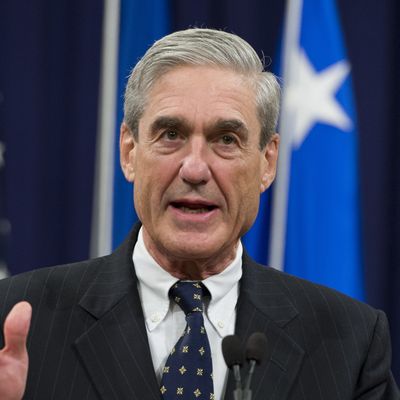
Politics, punditry and human nature being as they are, the late-Friday news that special prosecutor Robert Mueller’s final report has been transmitted to the attorney general (and will be described in summary form to Congress very soon) has spurred a frenzy of speculation, and the first of many leaks (credible and otherwise). The most prominent detail is that Mueller isn’t recommending any additional indictments in his probe of possible collusion with Russia by the Trump campaign or obstruction of justice by the president himself.
If that is true, you can be sure that the president and his allies will gloat that even Robert Mueller admits that his investigation was a witch hunt producing nothing but fresh evidence that the president has been unjustly persecuted by rogue elements in the FBI and the Justice Department. Indeed, as the Washington Post’s David Weigel notes, Republicans will soon try to decisively change the subject and turn the tables:
Even if the “no more prosecutions” reports are accurate, though, the president’s hardly out of the woods with respect to scandals involving his presidency, his campaign, or his personal business.
The Mueller report could contain facts, leads and hints that not only cast doubt on the president’s integrity, but also give material to other, later prosecutions.
Just because Mueller considers a certain batch of evidence not grounds for a prosecution on his own motion doesn’t mean it might not create future legal and political jeopardy for Trump. Other prosecutors pursuing other angles could pick up on his findings. And to the extent the Justice Department doubts a sitting president can be indicted at all, the report could provide evidence that will sit, ticking like a time bomb, until he leaves office.
Michael Cohen’s conviction for campaign finance violations is a potentially direct threat given Cohen’s allegations about the president’s personal involvement in hush payment to women with explosive charges of adultery against Trump that surfaced in 2016.
But separate federal investigations of Trump’s business dealings by the staff of the U.S. Attorney for the Southern District of New York are even more potentially deadly, and they involve matters well beyond the scope of the Mueller investigation, as Politico reported last month:
Manhattan-based federal prosecutors can challenge Trump in ways Mueller can’t. They have jurisdiction over the president’s political operation and businesses — subjects that aren’t protected by executive privilege, a tool Trump is considering invoking to block portions of Mueller’s report. From a PR perspective, Trump has been unable to run the same playbook on SDNY that he’s used to erode conservatives’ faith in Mueller, the former George W. Bush-appointed FBI director. Legal circles are also buzzing over whether SDNY might buck DOJ guidance and seek to indict a sitting president.
The threat was highlighted when SDNY prosecutors ordered officials from Trump’s inaugural committee to hand over donor and financial records. It was the latest aggressive move from an office that has launched investigations into the president’s company, former lawyer and campaign finance practices. New York prosecutors have even implicated Trump in a crime.
Add it all up and the result is a spate of hard-to-stymie, legally perilous probes that appears on track to drag on well into Trump’s 2020 reelection campaign. SDNY stands poised to carry on Mueller’s efforts whenever the special counsel’s office closes shop
Then there’s the possibility of state investigations into Trump’s business and charitable operations, as the Washington Post recently explained:
[T[he end of the federal investigation into the 2016 campaign clears the path for criminal charges in multiple states. That should worry the president and the people in his circle.
Early in his investigation, Mueller was reportedly sharing information he had gathered with the then-attorney general of New York, Eric Schneiderman, regarding Paul Manafort and his money-laundering activities. The evidence-sharing suggested the state of New York had a potential interest in looking at conduct that violated both state and federal law. More recently, the New York Attorney General sued the Trump Foundation, alleging a “shocking pattern of illegality” in its use and accounting of charitable funds (the foundation was shut down in December), and the New Jersey attorney general issued a subpoena to Trump’s campaign for the financial records of his inaugural fund. Although these are both civil actions, they could reveal violations of state criminal laws concerning tax and financial fraud by members of the Trump campaign or Trump Organization.
Beyond all these ongoing legal threats to Trump and his interests, of course, anything Mueller provides in the way of hints of misconduct or crimes by the president and his circle could be followed up on in the wide-ranging investigations being undertaken by various House committees now that Democrats control them. Anything they ultimately produce could provide additional grist for federal and state prosecutors, present or future, and possibly, for those arguing the president is guilty of high crimes and misdemeanors justifying impeachment proceedings.
All of the continuing sources of legal and political peril for the president will predictably lead to loud demands from the White House and the president’s congressional and media allies that all inquiries cease and desist now that Mueller has supposedly exonerated the president. That won’t happen, but the spin wars over Mueller’s report will begin even before its details make their way in the public domain.






























